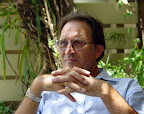I just read Yasmina Khadra's book L'attentat, published in 2005 by Éditions Julliard in Paris, France (an English translation with the title The Attack is foreseen to come out in May 2006). I finished the 268 pages in less than two days. The book ranks in my appreciation among the best I've come across over the many years I have been reading novels, which, I must mention, I choose selectively as I am a slow reader. Yasmina Khadra (whose real name is Mohammed Moulessehoul) has the kind of imaginative mind that also characterizes writers such as Gabriel García Márquez, Italo Calvino, and John Coetzee. While the reader progresses through the book an ever more intricate picture emerges of a reality that has no explanation in any single kind of logic. The more one advances, the more one becomes aware of the painful yet beautiful complexities of life and the realization that one reconciles with life's perpetual onslaught on life ultimately only in death.
Does it matter that the story is set in the Middle East and thus includes some of the ingredients that link it in our mind to the generalized anxiety generated by such highly publicized events as 9/11 and the bombings in Madrid and London? I don't think so. The ability to engage in incomprehensible acts of violence is not new to the world. It existed long before 9/11, Abu Ghraib and Guantánamo. We readily take incomprehensible violence for granted when it can somehow be embedded in the dominant discourses of the group to which we pertain ourselves and get confused and disturbed when it is part of the discourse of another community. The strength of Khadra’s literary creation is that there is no attempt in L’attentat to explain, categorically condemn or justify anything. The book refrains from demarcating good and evil, even though some of the most horrific human made events and circumstances provide the setting for the protagonist’s quest to comprehend.
This book is a welcome antithesis to some current trends to explain the complexities of the present day world away in terms of simplistic notions such as the clash of civilizations and cultures, or by dividing the world up in spheres of good and evil. In this book everything is human--and that isn't always entirely easy, but it’s real.
Books like Khadra’s L‘attentat, García Márquez’s Cien años de soledad (Hundred years of solitude), Calvino’s Se una notte d'inverno un viaggiatore (If in a winter’s night a traveler), or Coetzee’s Life and times of Michael K leave permanent marks in the mind in the form of complex images that are open-ended. It is this complex open-endedness that allows such marks in the mind to serve as architectural landmarks in building the mind’s capacity to interact with the world from perspectives that are increasingly more complex and eco-self-organizing, a term I borrow from Edgar Morin (see e.g. Introduction á la pensée complexe, Paris, Éditions du Seuil, 2005). For such complex images to take hold in the mind in an eco-self-organizing manner one must be emotionally prepared to receive and integrate them. When that happens, learning will be profound. It goes without saying that such deep learning can only take place under condition of non-coerciveness.
Sunday, April 16, 2006
Saturday, April 15, 2006
To school, or not to school: is that the question?
I have a kind of love-hate relationship with the school. Having spent significant parts of my life in school settings (from kindergarten to postgraduate level; as student, teacher and administrator), I owe some of my best and some of my worst experiences to the school. If given the opportunity, much can easily be improved. In fact, on various occasions did I take such opportunities or did opportunities accidentally come my way. My experience is that in such cases most of what was needed to generate the desired improvements was simply the willingness to take a step back from past - institutionalized - positions and collaboratively create an environment of trust. The rest then followed.
Unfortunately, few institutionalized school environments are based on trust (for an exception see some of the experience reported at http://adec.edu.au/idec/idec-2006/) and more than just trust may be needed for still more fundamental changes. Thus, I am currently and for the next two weeks facilitating an online dialogue on the question in the title of this post. It’s a question regarding the two options, or any mix of those options, and a question regarding the question itself. Is the first question relevant? If so, why - and what does it lead to? If not, what other or additional questions must be asked?
More about the dialogue can be found at http://www.learndev.org/ToSchoolOrNotToSchool.html. At the same URL there is also a link to a two-page introductory statement that aims at serving as a prompt for the discussion. Besides, details are available about how to access and/or participate in the dialogue, which runs until April 27, 2006.
Unfortunately, few institutionalized school environments are based on trust (for an exception see some of the experience reported at http://adec.edu.au/idec/idec-2006/) and more than just trust may be needed for still more fundamental changes. Thus, I am currently and for the next two weeks facilitating an online dialogue on the question in the title of this post. It’s a question regarding the two options, or any mix of those options, and a question regarding the question itself. Is the first question relevant? If so, why - and what does it lead to? If not, what other or additional questions must be asked?
More about the dialogue can be found at http://www.learndev.org/ToSchoolOrNotToSchool.html. At the same URL there is also a link to a two-page introductory statement that aims at serving as a prompt for the discussion. Besides, details are available about how to access and/or participate in the dialogue, which runs until April 27, 2006.
Subscribe to:
Comments (Atom)

